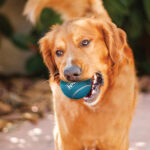
When it comes to keeping your Labrador Retriever healthy and happy, their diet plays a crucial role. Known for their friendly nature and high energy levels, Labradors require a balanced diet packed with essential nutrients to thrive. In this article, we’ll explore the key nutrients your Lab needs, common dietary concerns, and recommended feeding schedules, ensuring your furry friend gets the best care possible.
Key Nutrients for Labrador Retrievers
Protein
Protein is fundamental for building and repairing tissues, and high-quality animal protein sources are best. Look for dog foods with named meat meals like chicken, beef, or fish as primary ingredients. This ensures your Labrador gets the essential amino acids needed for muscle growth and overall health.
Fats
Fats are a vital energy source and support the health of your Lab’s skin and coat. Omega-3 and Omega-6 fatty acids, found in fish oil and flaxseed, are particularly important. They help reduce inflammation, support joint health, and maintain a shiny coat.
Carbohydrates
Carbohydrates provide the necessary energy for your active Labrador. Whole grains and vegetables are preferable over simple carbohydrates, as they offer a more sustained energy release and contain additional fiber, which aids digestion.
Vitamins
A balanced diet should include a variety of vitamins to support your Lab’s overall health. Vitamins A, D, E, and K are particularly crucial, as they play roles in vision, bone growth, antioxidant protection, and blood clotting. Ensure your dog’s food contains a balanced mix of these essential vitamins.
Minerals
Minerals like calcium and phosphorus are crucial for bone health, while others such as zinc, iron, and selenium play vital roles in various bodily functions. Look for a dog food formula that includes a comprehensive mix of these essential minerals.
Common Dietary Issues and Health Concerns
Obesity
Labradors are prone to overeating, which can easily lead to obesity. Managing portion sizes and ensuring a balanced diet is crucial. Avoid free-feeding and stick to measured portions to keep your Lab at a healthy weight.
Joint Problems
Due to their active lifestyle, Labradors are susceptible to joint issues. A diet rich in Omega-3 fatty acids can help reduce inflammation and support joint health. Consider supplements or foods that contain glucosamine and chondroitin as well.
Allergies
Labs can be sensitive to certain ingredients in their food. Common allergens include grains, dairy, and certain proteins. Monitor your dog for signs of allergies, such as itching, ear infections, or gastrointestinal upset, and avoid foods that trigger these reactions.
Bloating
Labradors have deep chests, making them susceptible to bloat (gastric dilatation volvulus), a serious and potentially life-threatening condition. To reduce the risk, feed smaller, more frequent meals and avoid excessive physical activity immediately before or after feeding.
Recommended Feeding Schedule
Puppies Up to 6 Months
Puppies have rapid growth and high energy needs, so they should be fed three meals a day. This frequent feeding schedule supports their development and helps maintain their energy levels throughout the day.
From 6 Months to Adulthood
At around six months, transition your Labrador to two meals a day. This schedule provides better control over their appetite and weight, helping to prevent obesity.
Establishing a Routine
Consistency is key. Ensure meals are given at the same time each day to establish a routine. A regular feeding schedule can also help prevent bloat by reducing the likelihood of your dog gulping down food too quickly.
Conclusion
Providing your Labrador Retriever with a balanced and nutritious diet is essential for their health and well-being. By focusing on high-quality protein, healthy fats, complex carbohydrates, and a mix of vitamins and minerals, you can ensure your Lab thrives. Keep an eye out for common dietary issues such as obesity, joint problems, allergies, and bloat, and adjust their diet and feeding schedule accordingly.
If you have any questions or need personalized advice, consider booking a consultation with a veterinary nutritionist. They can provide tailored recommendations based on your Labrador’s specific needs and health conditions.








